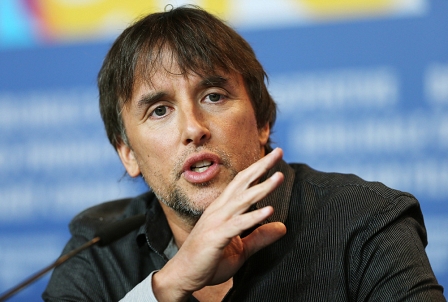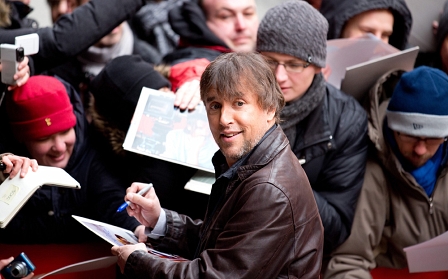Erstellt am: 26. 6. 2013 - 18:47 Uhr
"I like the collaboration with others"
Das Interview mit Richard Linklater ist am Mittwoch, den 26. Juni, ab 20 Uhr in der FM4 Homebase zu hören.
In "Before Sunrise" haben sie sich kennen gelernt und in "Before Sunset" haben sie sich füreinander entschieden. Derzeit machen sie in "Before Midnight", mittlerweile als Ehepaar, eine romantische Krise durch. Die Rede ist von Jesse und Celine, gespielt von Ethan Hawke und Julie Delpy, die in den Filmen seit 18 Jahren beim Spaziergehen ihre Beziehung zerpflücken. Hinter dem cineastischen Walk & Talk-Konzept steckt US-Regisseur Richard Linklater.
Mit seinem ersten Lowbudget-Movie hatte er 1991 den Nerv einer ganzen Generation getroffen und gleichzeitig der Post-Hippie-Gemeinde einen Namen gegeben: "Slacker". Sie sind überqualifiziert und unterbezahlt, und so hängen die Jugendlichen im Film "Slacker" einfach nur herum und philosophieren endlos über ihren ereignislosen Alltag. Kurt Cobain hat uns zur selben Zeit den Grunge geschenkt, Douglas Coupland seinen Bestsellerroman "Generation X" und Richard Linklater hat mit dem Film "Slacker" die US-Independent-Filmszene neu defininiert - ein Meisterstreich, der ihn bald darauf nach Hollywood bringen sollte.
FM4-Filmredakteurin Petra Erdmann hat sich mit dem Filmemacher zum Interview getroffen.

EPA/DPA/HANNIBAL HANSCHKE
Petra Erdmann: "Do you remember how you felt about the success of "Slacker" and that the word "slacker" became a cultural term?"
Richard Linklater: "I remember being very surprised. On one hand, it couldn´t have gone any better to see something you did that was very personal, to work its way into culture. And we had President Clinton using the word "slacker" and, you know, it was just so odd to me to be positioned at that moment in time as something more meaningful. You know they were talking about Douglas Coupland´s book "Generation X" and Nirvana's album "Nevermind". That book, that album, and "Slacker" all came out in 1991. There were magazines and editorials which put all these three things together, saying they spoke for a generation. I was kind of amused by it because it quickly took on a tone of something, something I had created was now out in the world and it would be interpreted however the world wanted to interpret it: positive or negative. And it took one kind of a negative slam like older people. "Slacker" became kind a pejorative negative like "lazy", an apathetic term. They started projecting things that just frankly aren´t in the movie."
"There was this hilarious line in "Slacker" when this crazy girl met two other young people talking about Madonna’s pap smear (gynäkologischer Abstrich) and she wanted to sell it."
Richard Linklater: "That was my first experience of putting something out in the world and you just have to accept what bounces back. And at some point out there, you can't control anything so that makes you kind of vulnerable and a little edgy. So usually by the time anything is really happening with the film I've done, or not happening, I've really moved on. When all that was going on with "Slacker" that you asked earlier, frankly I was sick of it. I was just trying to get my next film made: "Dazed and Confused". I had a script and that's all I was thinking about. "Slacker" was just a kind of a nuisance at that point. I was onto the next story I was trying to tell.
"
Dazed and Confused
Die High-School Komödie "Dazed and Confused" von 1993 war Richard Linklaters zweiter Film und erste Hollywood-Arbeit. In "Dazed and Confused" schaut Linklater einem Haufen Schüler Ende der 1970er Jahre beim Partymachen und coolen Cruisen zu. Unter anderen war auch Matthew MacConaughey dabei, ein damals unbekanntes Gesicht, der einen Aufreißer spielt, der 16-jährige Mädchen beeindrucken will. Richard Linklater erinnert sich daran, dass ihm die Studiobosse vorgeworfen hatten, zu wenig Stars in seinen Filmen zu haben. Neben Matthew MacConaughey hat übrigens auch Ben Affleck in "Dazed and confused" seine erste Kinorolle bekommen.

EPA/DPA/KAY NIETFELD
Richard Linklater: "This could never happen today but I was able to make a studio film with no stars in it. That was their complaint when it came to the time to sell the film. They said: 'Ah, it´s just a film with a bunch of people no one knows.' And I said: 'Well, you´re Hollywood. Don´t you make stars? You are the star-making machinery!' And they didn´t like the film that much. So they never really got behind that.
"
"And you worked also with Keanu Reeves or Robert Downey Jr."
Richard Linklater: "I think one of the great rewards of making movies, and this is what I wanted in some way when I was younger, I was a writer and just wanted to be a writer but I realized that wasn´t gonna satisfy all my needs, you know, filmmaking to me was much more... I like the collaboration with others. I like heading an artistic group and trying to get the best out of people. And I think that´s what a director does: You recognize the greatness in others kind like a head coach might. You´re bond for life in a way. So if I ran into Robert Downey Jr. or Woody Harrelson or Winona Ryder - you know someone you have worked with - you immediately go back to that time, you look at each other and you´re just kind of happy. You know if that was a happy time you´re just kind of you´re back in that. So you have this sort of serial monogamy, ha ha. You go from one creative relationship to the next.
"
US-Regisseur Richard Linklater im FM4 Interview Podcast
Interviews in voller Länge gibt´s im FM4 Interview Podcast
Mit Petra Erdmann redet Richard Linklater unter anderem über die US-Independent-Filmwelt, was Bill Clinton mit "Slacker" zu tun hat und warum der US-Regisseur kein eigenes Facebook-Profil hat.
Dieses Element ist nicht mehr verfügbar


